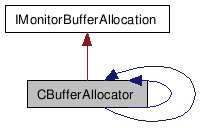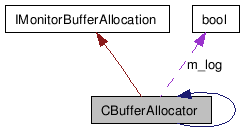CBufferAllocator Class Reference


Public Types | |
| enum | AllocationFlags { SizeInBytes = 0x00, SizeInPages = 0x01, RoundUpToPageSize = 0x02, UseByteAllocator = 0x00, UsePageAllocator = 0x10, SizeBitsMask = 0x0F, AllocatorBitsMask = 0xF0 } |
| These flags are passed to the constructor of the allocator. SizeInBytes is the default flag and gives a buffer with a bufferSize in bytes and uses C++ new to allocate the memory; this is consistent with previous versions of the library. If you specify the UsePageAllocator flag then the buffers are allocated with VirtualAlloc() and are page aligned. If you specify RoundUpToPageSize your buffer size is taken as a base and the size of the buffer's housekeeping data is added on and the total size is then rounded up to the next multiple of the system's page size. If you specify SizeInPages then the bufferSize is multiplied by the system's page size to give the size of the memory that is allocated, the actual usable buffer size in such an instance is the memory allocated less the buffer's housekeeping data. More... | |
| typedef unsigned long | BufferCount |
| typedef ULONG_PTR | CallbackUserData |
| typedef IBuffer::BufferSize | BufferSize |
Public Member Functions | |
| CBufferAllocator (BufferSize bufferSize, BufferCount maxFreeBuffers, bool log=true) | |
| CBufferAllocator (BufferSize bufferSize, BufferCount maxFreeBuffers, AllocationFlags flags, bool log=true) | |
| CBufferAllocator (const CBufferAllocator &rhs) | |
| ~CBufferAllocator () | |
| CBufferAllocator & | operator= (const CBufferAllocator &rhs) |
| BufferCount | EnlargePool (BufferCount buffersToAdd) |
| Add buffersToAdd buffers to the pool. | |
| JetByteTools::Core::IIndexedOpaqueUserData::UserDataIndex | RequestUserDataSlot (const JetByteTools::Core::_tstring &name) override |
| Request a named user data slot and get an index to use in calls to methods on IIndexedOpaqueUserData. | |
| JetByteTools::Core::IIndexedOpaqueUserData::UserDataIndex | LockUserDataSlots () override |
| Prevent more user data slots from being allocated. Returns the number of user data slots that have been allocated. | |
| CSmartBuffer | Allocate () override |
| Allocate an instance of IBuffer, remember to call Release() on it when you're done with it. | |
| CSmartBuffer | AllocateCustomSizedBuffer (BufferSize bufferSize) override |
| CSmartBuffer | AllocateCustomSizedBuffer (BufferSize bufferSize) override=0 |
| Creates a buffer that is a specific size rather than the size that the allocator usually creates. These buffers are currently NOT pooled and are deleted when the last reference is released. | |
| void | AllocateBuffers (size_t numBuffers, CBufferChain &buffers) override |
| void | AllocateBuffersForBytes (size_t numBytes, CBufferChain &buffers) override |
| BufferSize | GetBufferSize () const override |
| If an allocator is supplied or if any AllocationFlags other than SizeInBytes is specified then the actual usable size of the buffer will not be known until the user data slots of the allocator have been locked. This happens automatically when the first buffer is allocated or can be done at any time prior to that by calling LockUserDataSlots() explicitly. If GetBufferSize() before the usable size of the buffer is known then an exception is thrown. | |
| bool | Flush () override |
| Flushes the allocator. Use with care as this forces active buffers to be released and destroyed! Generally only called as part of process cleanup and even then only to aid in buffer leak tracking. | |
| BufferCount | GetNumActive () const |
| BufferCount | GetNumPooled () const |
| void | IterateActiveList (CallbackUserData userData, const BufferIterationCallback &callback) |
Static Public Attributes | |
| static const BufferCount | NoPooledBuffers = std::numeric_limits<CBufferAllocator::BufferCount>::max() |
| Pass this value as maxFreeBuffers to constructors to create an allocator that doesn't pool buffers at all. | |
| static const BufferCount | MaxBufferCount = std::numeric_limits<CBufferAllocator::BufferCount>::max() - 1 |
| static const JetByteTools::Core::IIndexedOpaqueUserData::UserDataIndex | DefaultBufferChainIndex = 0 |
| static const JetByteTools::Core::IIndexedOpaqueUserData::UserDataIndex | NumberOfDefaultUserDataSlots = 1 |
Static Protected Member Functions | |
| static void | AllocateDefaultUserDataIndices (JetByteTools::Core::IProvideUserData &dataProvider) |
Member Typedef Documentation
typedef unsigned long BufferCount [inherited] |
typedef ULONG_PTR CallbackUserData [inherited] |
typedef IBuffer::BufferSize BufferSize [inherited] |
Member Enumeration Documentation
enum AllocationFlags [inherited] |
These flags are passed to the constructor of the allocator. SizeInBytes is the default flag and gives a buffer with a bufferSize in bytes and uses C++ new to allocate the memory; this is consistent with previous versions of the library. If you specify the UsePageAllocator flag then the buffers are allocated with VirtualAlloc() and are page aligned. If you specify RoundUpToPageSize your buffer size is taken as a base and the size of the buffer's housekeeping data is added on and the total size is then rounded up to the next multiple of the system's page size. If you specify SizeInPages then the bufferSize is multiplied by the system's page size to give the size of the memory that is allocated, the actual usable buffer size in such an instance is the memory allocated less the buffer's housekeeping data.
Constructor & Destructor Documentation
| CBufferAllocator | ( | BufferSize | bufferSize, | |
| BufferCount | maxFreeBuffers, | |||
| bool | log = true | |||
| ) |
| CBufferAllocator | ( | BufferSize | bufferSize, | |
| BufferCount | maxFreeBuffers, | |||
| AllocationFlags | flags, | |||
| bool | log = true | |||
| ) |
| CBufferAllocator | ( | const CBufferAllocator & | rhs | ) |
| ~CBufferAllocator | ( | ) |
Reimplemented from CBufferAllocator.
Member Function Documentation
| CBufferAllocator& operator= | ( | const CBufferAllocator & | rhs | ) |
| CBufferAllocator::BufferCount EnlargePool | ( | BufferCount | buffersToAdd | ) | [inherited] |
Add buffersToAdd buffers to the pool.
| JetByteTools::Core::IIndexedOpaqueUserData::UserDataIndex RequestUserDataSlot | ( | const JetByteTools::Core::_tstring & | name | ) | [override, virtual, inherited] |
Request a named user data slot and get an index to use in calls to methods on IIndexedOpaqueUserData.
Implements IProvideUserData.
| UserDataIndex LockUserDataSlots | ( | ) | [override, virtual, inherited] |
Prevent more user data slots from being allocated. Returns the number of user data slots that have been allocated.
Implements IProvideUserData.
| CSmartBuffer Allocate | ( | ) | [override, virtual, inherited] |
Allocate an instance of IBuffer, remember to call Release() on it when you're done with it.
Implements IAllocateBuffers.
| CSmartBuffer AllocateCustomSizedBuffer | ( | BufferSize | bufferSize | ) | [override, inherited] |
| CSmartBuffer AllocateCustomSizedBuffer | ( | BufferSize | bufferSize | ) | [override, pure virtual, inherited] |
Creates a buffer that is a specific size rather than the size that the allocator usually creates. These buffers are currently NOT pooled and are deleted when the last reference is released.
Implements IAllocateBuffer.
| void AllocateBuffers | ( | size_t | numBuffers, | |
| CBufferChain & | buffers | |||
| ) | [override, virtual, inherited] |
Implements IAllocateBuffers.
| void AllocateBuffersForBytes | ( | size_t | numBytes, | |
| CBufferChain & | buffers | |||
| ) | [override, virtual, inherited] |
Implements IAllocateBuffers.
| IAllocateBuffers::BufferSize GetBufferSize | ( | ) | const [override, virtual, inherited] |
If an allocator is supplied or if any AllocationFlags other than SizeInBytes is specified then the actual usable size of the buffer will not be known until the user data slots of the allocator have been locked. This happens automatically when the first buffer is allocated or can be done at any time prior to that by calling LockUserDataSlots() explicitly. If GetBufferSize() before the usable size of the buffer is known then an exception is thrown.
Implements IAllocateBuffers.
| bool Flush | ( | ) | [override, virtual, inherited] |
Flushes the allocator. Use with care as this forces active buffers to be released and destroyed! Generally only called as part of process cleanup and even then only to aid in buffer leak tracking.
Implements IAllocateBuffers.
| CBufferAllocator::BufferCount GetNumActive | ( | ) | const [inherited] |
| CBufferAllocator::BufferCount GetNumPooled | ( | ) | const [inherited] |
| void IterateActiveList | ( | CallbackUserData | userData, | |
| const BufferIterationCallback & | callback | |||
| ) | [inherited] |
| static void AllocateDefaultUserDataIndices | ( | JetByteTools::Core::IProvideUserData & | dataProvider | ) | [static, protected, inherited] |
Member Data Documentation
const CBufferAllocator::BufferCount NoPooledBuffers = std::numeric_limits<CBufferAllocator::BufferCount>::max() [static, inherited] |
Pass this value as maxFreeBuffers to constructors to create an allocator that doesn't pool buffers at all.
const CBufferAllocator::BufferCount MaxBufferCount = std::numeric_limits<CBufferAllocator::BufferCount>::max() - 1 [static, inherited] |
const JetByteTools::Core::IIndexedOpaqueUserData::UserDataIndex DefaultBufferChainIndex = 0 [static, inherited] |
const JetByteTools::Core::IIndexedOpaqueUserData::UserDataIndex NumberOfDefaultUserDataSlots = 1 [static, inherited] |
 1.5.3
1.5.3